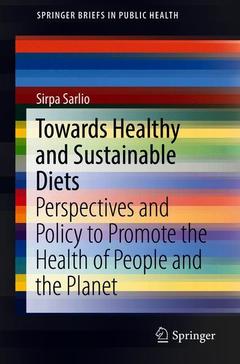Towards Healthy and Sustainable Diets, 1st ed. 2018 Perspectives and Policy to Promote the Health of People and the Planet SpringerBriefs in Public Health Series

This clear-sighted volume synthesizes wide-ranging knowledge of human food consumption, food production systems, and sustainability to offer methods of improving the impact of food choices on people and the environment. The comprehensive coverage addresses myriad challenges and paradoxes (e.g., health-conscious food choices that put greater stress on the planet, hunger amidst plenty) associated with the production of sustainable, nutritious food. Direct and complex links between local and global issues are highlighted in innovative approaches to transforming food production from the farm to the table and from the policy desk to the real world. Chapters identify, examine, and offer realistic recommendations for achieving critical goals, among them:
- Supporting healthy people and communities within planetary boundaries
- Reduction and prevention of food waste
- Combining health and sustainability on the plate
- "Serving sustainable and healthy food to consumers and decision makers": from commitment to action.
- Investing in healthier and more sustainable production.
- Ensuring a healthy sustainable diet is a goal of all public policies.
Towards Healthy and Sustainable Diets is geared toward professionals and policymakers dealing with food, nutrition, and environmental topics seeking new perspectives on longstanding issues in these interrelated areas. It also makes a suitable reference for students studying and conducting research in these areas.
Is a comprehensive yet concise book about food that is good for the planet and also improves consumer health
Empowers readers to make changes happen, from everyday shopping and community action to the agendas of consumers and decision makers
Describes a multidisciplinary and systemic approach to sustainability with synergies and benefits for people and for the planet
Date de parution : 03-2018
Ouvrage de 85 p.
15.5x23.5 cm
Thèmes de Towards Healthy and Sustainable Diets :
Mots-clés :
healthy sustainable diets; sustainable food production; environmental diets; food waste; climate impact of foods; ecological footprint; sustainable dietary guidelines; food system policy; food and nutrition security; sustainable consumption; climate-friendly food; sustainable shopping basket; healthy food; food and nutrition science; environmental health; public health nutrition; food safety; public health policy; sustainable agriculture; climate change



